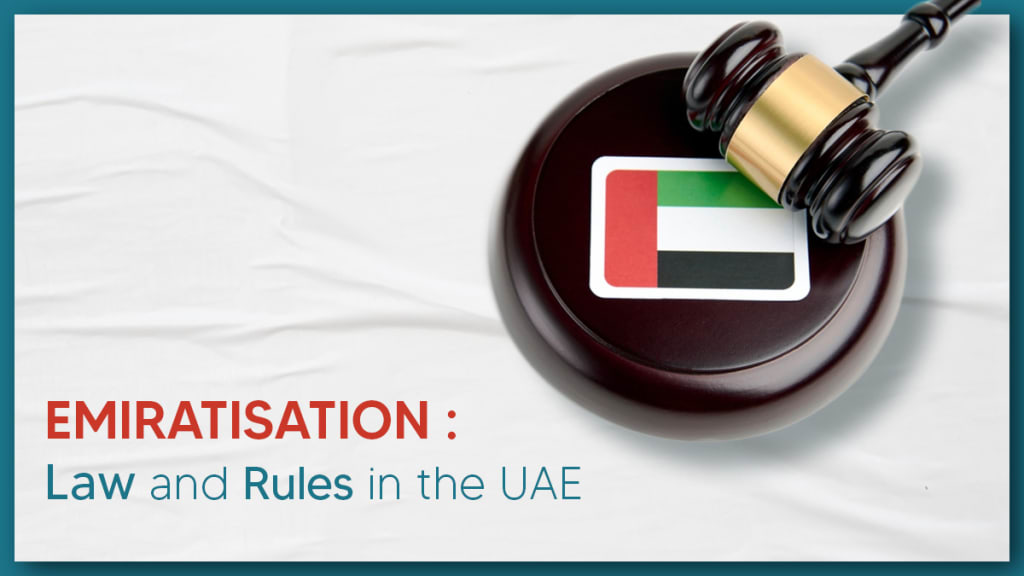Emiratisation law and rules in the UAE
UAE Emiratisation Rules

It's been a long since the government of the United Arab Emirates implemented regulations to increase Emiratisation in UAE companies. The key objective of this program was to increase the participation of UAE nationals in the private sector. That is why, it introduced new UAE Emiratisation law wherein companies have to employ a nominal percentage of employees every year in order to increase the competitiveness of the Emirati workforce and empower them to occupy jobs in the country.
Continue reading to know more about Emiratisation and the new rules related to it.
What is Emiratisation?
Emiratisation is an innovative approach by the UAE Government mandating the participation of UAE nationals within the public as well as private sectors. The main aim of this initiative was to boost the contribution of UAE nationals to the national economy by increasing their ratio in the workforce. Although the public sector largely acknowledged this program, the private sector had yet to make huge progress in joining Emiratis into their workforce. Therefore, the cabinet decided to mandate the recruitment of UAE nationals in the private sector.
Previous Emiratisation rule
In the past decade, the UAE has significantly enhanced Emiratisation. Earlier the Emiratisation quotas were a requirement only in the banking and insurance sector, 4% and 5% respectively on an annual basis. However, in 2017, initiatives like “Tawteen” and the Nafis Scheme were launched asking employers to meet a benchmark of employing 2% Emiratis upon achieving a workforce of 50 employees or more, which means 1 Emirati for every 50 employees.
Objectives of new Emiratisation rule
The government aims to challenge employers with the new Emiratisation decree as it will attract and retain Emirati talent in the UAE labor market. Therefore, companies have to make an effort and come up with measures such as short-term incentive programs, international secondment initiatives, and more, to tackle the achievement of these targets and retain talent.
Nafis
One of the UAE’s ‘Projects of the 50’, Nafis is a governmental federal program that aims to create a partnership between the private and public sectors to generate equal job opportunities for Emirati nationals. It thus encourages and supports talented Emiratis to pursue their professional careers in the UAE private sector.
Apart from the Emiratisation, law, the Nafis scheme has also announced several other initiatives such as career counseling, apprenticeship program support, Emirati salary support scheme, merit programs, and many more.
Benefits of the Nafis scheme
As the Emiratisation law is a part of the Nafis scheme, any registered company that meets the requirement of this program will be eligible for –
- a reduction in employer pension contribution for UAE nationals,
- salary contribution of up to AED 8,000 for each UAE national hired under the NAFIS scheme.
The whole program may seem a bit confusing and complicated, but the business professionals at Shuraa can explain it to you in layman's terms so that your company stays safe from any legal implications.
Changes to the UAE Emiratisation law
- Companies operating under the jurisdiction of the Ministry of Human Resources and Emiratisation (MOHRE) have to follow the new Emiratisation laws. The government of UAE has brought changes in the legislation:
- Ministerial Decision No, 279 of 2022 – 2% Emiratisation in the private sector
- Cabinet Decision No. 18 of 2022 (Classification Law)
- Benefits of new rules under the Nafis scheme
The MOHRE declared that at least 2% workforce of private companies has to be Emirati on the provision of at least 50 workers on their payroll. The authority also confirmed to implement this rule across the UAE mainland, excluding certain free zones like Dubai International Financial Center & Abu Dhabi Global Market.
You Also read the post: Getting a Free Zone License in Dubai
Requirements of the 2% Emiratisation rule in UAE
According to the new UAE Emiratisation law, any private company with 50 employees or less on their payroll needs to have one Emirati, and with 51 to 100 employees, two Emiratis are the requirement.
Organizations in UAE can calculate this rate on the basis of the number of skilled workers employed. For instance,
50 workers - minimum of 1 Emirati employee
51-100 workers - minimum 2 Emirati employees
101-150 workers - minimum 3 Emirati employees
151 & above - 1 Emirati employee for every 50 or lesser worker
According to the Ministry of Human Resource and Emiratisation (MOHRE), skilled workers are those employees who:
- Belong to any of these categories:
Legislators, managers, business executives
Professionals and technicians in the field of science, technology & humanitarian
Writing professionals
Service & sales jobs
- Having secondary education, equal or higher
- Possess relevant authority attested worker’s certificate
- Receive a monthly salary of no less than AED 4,000
Penalties for non-compliance with UAE Emiratisation law
Companies that fail to fulfill the requirements of Emiratisation in UAE will be subject to the following penalties –
- A minimum fine of AED 6,000 per month for not hiring an Emirati employee. The fines will be levied from the beginning of the year and will increase annually. Furthermore, any kind of failure in fine payments can lead to the termination of work permit applications by the company.
- The entity that fails to comply with the 2% Emiratisation in UAE for two consecutive years will be demoted to the third category of the Classification Law.
The UAE government has announced to take stringent actions against the non-compliant companies. Hence, the entities operating in the country must ensure to show consistent assent towards hiring UAE nationals in order to avoid any financial & reputational repercussions.
For more updates on the compliance and non-compliance policies, connect with the business experts of Shuraa.
Classification of companies under the UAE Emiratisation Law
The MOHRE has classified companies under three categories –
Category 1:
Companies that achieve any of the following objectives will be classified under this category –
- increase their Emiratisation quotas at least three times above the target annually
- hire and train at least 500 Emiratis annually
- a small/medium company owned by a young UAE national
- a certified training and employment center
Entities falling under this category will be rewarded by MOHRE with nominal work permit fees of AED 250 for two years, except the employees from the UAE and the GCC.
Category 2:
Companies that do not meet the criteria of category 1, but still fulfill the Emiratisation quota fall under the 2nd category. For this category, the work permit fee is AED 1,200 for two years, except for UAE and GCC employees.
Category 3:
Entities that fail to meet the Emiratisation quota will fall under this category, and penalties will be imposed on them accordingly.
Wrapping up
The UAE Emiratisation law is in continuance of the government's vision for the upcoming future. The measures taken in favor of the Emiratis are to improve the sustainability of growth for the private sector and UAE workers, thus highlighting transparency and integrating the business environment in the UAE. Moreover, it intends to boost the labor market’s efficiency and stability, thereby making UAE a leading economy of the world.
If you have any further questions relating to this law, please feel free to contact the professional consultants of Shuraa Business Setup. Shuraa is a prominent company formation consultancy in UAE offering expert advisory services to investors seeking information on the latest UAE corporate updates.
So, stay updated with Shuraa on all the UAE corporate developments.
Phone: +97144081900
Mail-Id: [email protected]
Website: www.shuraa.com
About the Creator
Sakina Burhan
Sakina Burhan is a good experience writer, blogger and social media promoter by providing valuable information which helps readers to get more ideas.
Enjoyed the story? Support the Creator.
Subscribe for free to receive all their stories in your feed. You could also pledge your support or give them a one-off tip, letting them know you appreciate their work.






Comments
There are no comments for this story
Be the first to respond and start the conversation.